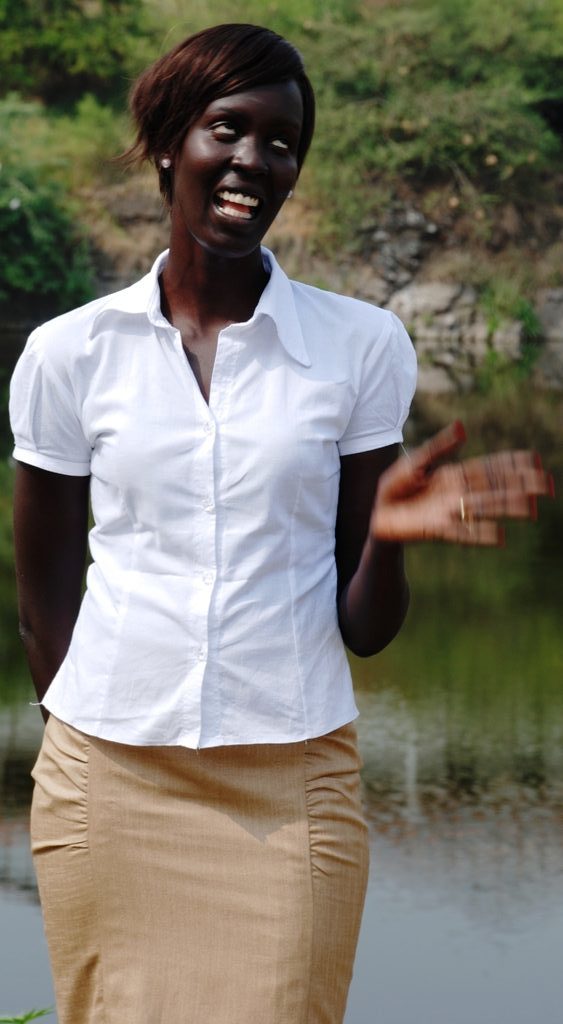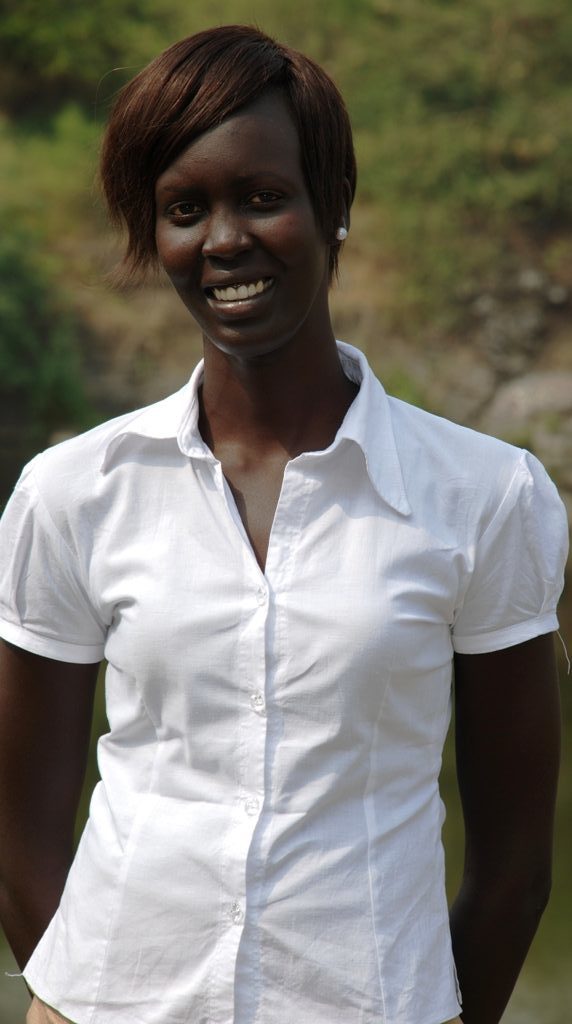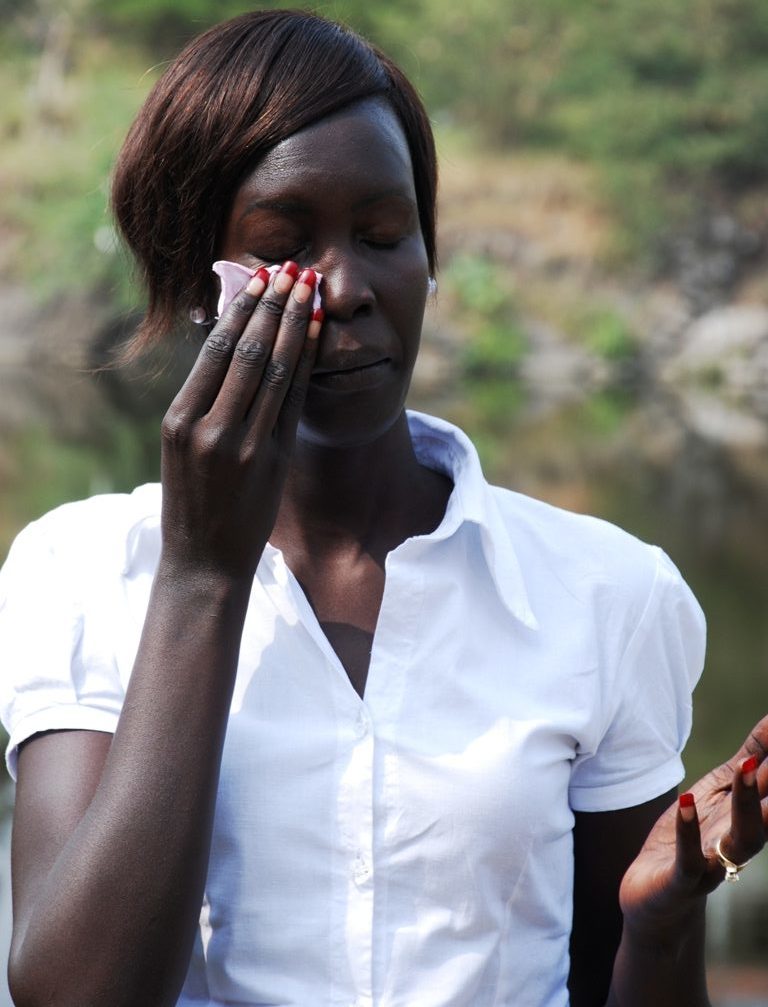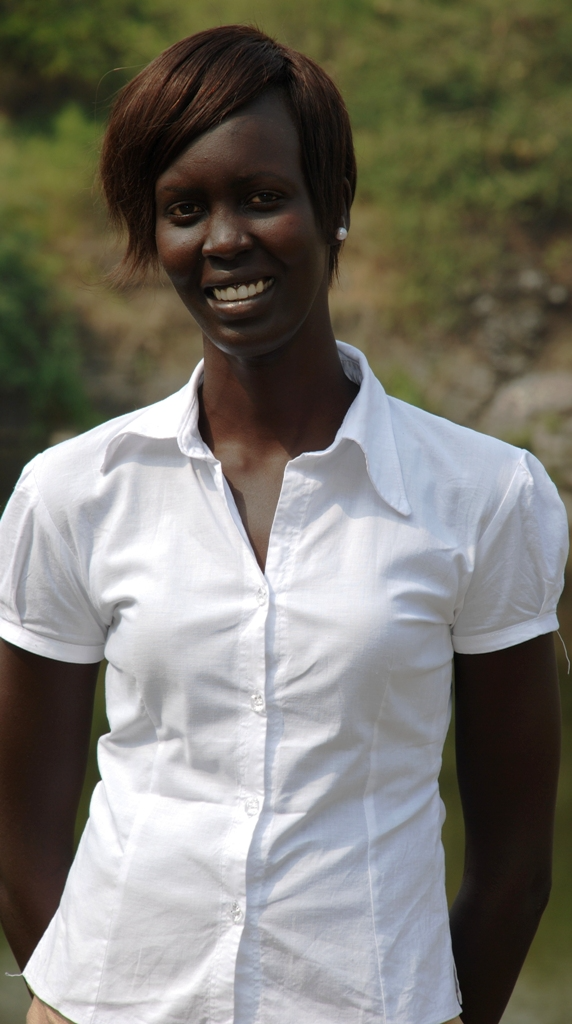Dad, Dr. Garang, Keribino and others said, ‘enough! We are not going to be secondary citizens in our country. We are going to the bush to fight’. I look like my father — most of us do. We couldn’t get onto the plane. We had to move at night. The Arabs had issued orders that, ‘if anything looks like Nyoun, Kill it’. We moved for three months from Malakal through Itanga, just going to Addis.



in this conversation with badru mulumba, NYAGOA WILLIAM NYOUN talks about her 1983 narrow escape from Malakal to Itanga, her first meeting with Alek Wek when they were both stars, her campaign against skin bleaching, and the burning desire that dragged her back home:-
When you first met Alek Wek, you must have been in awe of her.
NYOUN: I was in awe. But I had seen her work five years before. We did a show, Tyra Banks Show in New York. My surprise was to meet Alek Wek.
Q. What was it about?
We were just talking about how dark-skinned models were not getting enough jobs because they were so black. We had to campaign that black is beautiful. Then we got together. But mostly it was focusing on Sudan: that they should stop bleaching themselves.
Q. How often do you get in touch?
It was once – last year, or the year before. Largely, we don’t. She is busy with her life. I am busy with mine.
Q. yet, you want to bring her here. How are you going to pull that off?
I have some friends in New York working on that. She [alek]’s been here before, but she does some work in Wau, like building schools and such. But it would be good to talk to the young girls and tell them that bleaching is not good.
Q. You must be a big movement.
In Juba, we are trying, but outside we are big. We are everywhere, yes, because even when you go to Kenya it is more of the same thing. Light-skinned girls get to be on the cover of magazines, Television commercials. Dark skinned girls, no. Yet, we are Africans.
Q. Why so? Some people find dark skin very beautiful.
Dark skinned girls are beautiful — even light-skinned girls, if it is natural, but if you have to bleach your skin then it means there is something wrong with you. It’s a matter of civic education; tell them: this is harmful to your skin – it’s not good. They will stop. Mentally, especially in Sudan, it’s an Arab thing. If you’re light, you are beautiful. If you are black, you’re not. That is not right.
Q, How did such view become so widespread?
Light skin was treated differently. Even during slavery. If you were light, you were welcome to work in the house. If you were darker, they said you were more loyal to blacks because you were kept outside — you were dirty. You were supposed to be out in the sun. The concept during the war was that lighter skin put one closer to Arabs who then allowed one to work in the house. The thing just kept growing. Even here, in Juba, if you are the black bride you’re the ugliest bride.
Q. How would you know that?
I experienced that at my wedding. There was this traditional, Hinna, Arab thing. They kept coming to my mum saying, she needs to bleach; what kind of bride is she going to look like? And I am, like, I am supposed to be a black bride. I don’t need to bleach simply because the Hinna will not show. Two ladies literally refused to give me Hinna because I was too black.
Q. Even when you were paying?
Yes. They said I needed to go wash my skin because I looked dirty.
Q. And this was in Juba.
Yes. here, in Juba.
Q. Anyway, why modeling?
I did modeling professionally to pay for my college and my bills in the US. But now, I have the experience, I have the background. I just wanted to come home, see what I can do. There is potential here.
Q. You have a certain intriguing sophistication about you. What’s your background?
I wanted to be a doctor. I didn’t make it through pre-med because I didn’t have money. I decided to do nursing and become a registered nurse. I do have some nursing background because of my mother. But being in Sudan for the last three years I think now I want to be in the politics.
Q. Life is a constant struggle with different passions pulling in different directions, but nursing pays quite well outside Africa.
I don’t’ want to be in the west. I want to be in Africa. When I first came to Juba, the ministry of Health, if you were a doctor you would quit very quickly because you didn’t have equipment.
I have been here for two years. I have lost my nursing license in the U.S. — you need a hundred hours annually to keep the license. The money is good but home is here.
Q. so you woke up one day and that was it.
Yes. U.S. was never home. I am a citizen there, but most of my family is here. I told my friends I was going. Most didn’t believe it. They said, ‘she will come back’. And that was the time my modeling career was very high. I told them, no.
Q. We often find different sorts of shocks upon return. What was your shock when you stepped off the plane?
It’s the way people view others. I went to the US – yes, I was privileged — but my father was in the war. We had to be taken out of the country. Yet, returning, I felt like an outsider, that I run away from the problems and now I am coming back to get all the money, which is not true. I’m actually coming back to contribute and see what I can do. If we don’t fix this, then who will? My generation needs to return.
There was also cultural shock – coming from New York, the dressing — you really had to cut down everything. Any way you dressed — it just made people think that is who you are, reading you from the outside. You just had to blend in, lower expectations.
Q. Looks like you really came down to earth on that one.
I really cut down my knees and come to that level.
Q. You say that your dad was in the war. What is your earliest memory of him?
I remember when I was six or five years old – it was in 1986, no 83.
That is when my dad, William Nyoun, Dr. John Garang, Keribino and others decided to say, ‘enough! We are not going to be secondary citizens in our country. We are going to the bush to fight’. I look like my father — most of us do. We couldn’t get onto the plane. We had to move at night. The Arabs had issued orders that, ‘if anything looks like Nyoun, Kill it’. We moved for three months from Malakal through Itanga, just going to Addis. We, my mum and uncles, were either under the boats or walking in the dark. Father had already left.
Q. How was three months in the bush for a 6-year-old?
I remember being at a church. They were shooting at a church. They came to where we were sitting and somehow they changed their minds and went back.
Q. That must have been scary.
Yes. We were so quiet they thought there was no body nearby. When I came back in 2004 mum told me the exact same story. It’s still weird that I have that same exact story. She told me that we crossed the Nile, and my elder brother carried me on his head for three days, walking, and some people died along the way.
Q. You came back in 2004.
Fifteen years in the U.S. I still came back.
Q. How did you summon the courage to return before there was peace?
I went to Nairobi for the peace signing. It hit me then– because every day my dad would say, I am doing this for you, I am doing this for you. He was never in the house. Coming back in 2004, in Nairobi, you would see the reality was not what you left behind. My mum was saying, ‘If you’re not here who is going to fix it?’ When I went back to the US I decided I would come back home.
At the celebration, when they were signing the CPA, it was like dad never existed. Personally, that hurt me the most. I was, like, I have to come back. If it would cost me my life, I had to come back and make sure nobody forgets my father’s memory.
Q. Your mum comes across as quite huge a role model to you.
My mum is my role model. She’s my father, she’s my father. She’s very, very encouraging. With her, there is no race. For her it’s just respect. She doesn’t push us. I mean I was not married until I was 30. In Nuer culture, you have to marry by 25. She always encouraged: go to school, build yourself, make something of who you are, don’t listen to other people. She never listened to rumors.
Q. You’re describing a progressive kind of person. Where did she go to school because those days very few people got that opportunity?
She went to school in her hometown — one of the few ladies there who went to school. That’s how she met my father at the military base training. She is one of the few ladies who were trained in the military. She was a surgeon nurse.
Q. Retired?
No. She is still working, but now with nursing it is, like, you need resources, you need money. she is still in the military.
Q. Interesting woman. Back to you: Some people believe models never leave the glory of the catwalk unless time pushed them off the stage. You quit in your prime.
When you come to Africa, modeling is viewed as something wrong. It’s not respected: I was not sent to the U.S. to be a model. My father, if he were alive, would never approve. So, it was come home, get a job, support my family. I support my family. I can support them with modeling, but I need a career where I can be respected.
Q. A career like this movement against bleaching?
No, that is just like another organization to engage the girls. They need direction. People like us come back from outside. We have to tell them that what you see on TV is not the reality. The reality is different. A lot of them live by what they see on TV.
Q. what tickled you, made you walk down to an agency and say, take me in as a model?
When I was in California, 15, 16 years old, they would keep coming to my mom: ‘Please sign the contract. She will be a big model.’ And my mum refused saying, ‘she is going to school’. At that time, she was also hearing that modeling was about being on the Playboy magazine. She refused until I was 17, 18, when I could make my own decisions.
Q. Was it around the same time when Alek was making it big?
I was about 18 when Alek was making it big. California was a small place. I would do small fashion shows. Small this, small that. After 17, that is when I would go to the bigger places, go to New York, go to Las Vegas.
Q. Ever been on the cover of a magazine.
On the cover of some magazine in Utah and a cover of some magazine in Las Vegas. But I did work that is more private. You’re paid more when you do private events. If you have a collection, I do a show just for you only.
Q. Designers recruited you.
Yes, designers shopped me.
Q. A message to the Diaspora?
Come back home. Let’s fix our home. Whatever education you have, bring it. Let’s fix this, build our country. If we don’t do it, nobody will.




